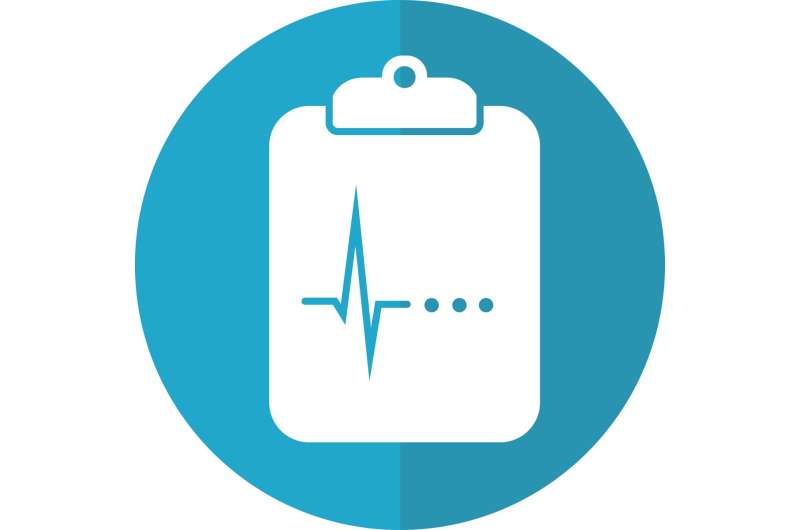This article has been reviewed according to Science X's editorial process and policies. Editors have highlighted the following attributes while ensuring the content's credibility:
fact-checked
peer-reviewed publication
trusted source
proofread
UK's National Health Service still reliant on paper notes and drug charts despite electronic upgrades

Three-quarters of trusts in England that responded to a survey by The BMJ are still reliant on paper patient notes and drug charts, despite progress towards electronic records and prescribing.
The results came in just as an expert panel convened by a House of Commons committee concluded that the UK government had failed to meet a key target to eliminate paper prescribing in hospitals and to introduce digital or electronic prescribing across the entire National Health Service (NHS) by 2024.
Jo Best, freelance journalist and doctor, argues that a continued reliance on paper is less safe and efficient—and difficulties with sharing electronic records are preventing even the most advanced trusts from realizing their full potential.
Under the NHS Long Term Plan, trusts are being challenged to achieve "a core level of digitization by 2024" and to "accelerate the rollout of electronic patient record (EPR) systems and apps," she explains. The current targets are that 90% of NHS trusts should have an EPR system by the end of 2023, and 95% by March 2025.
NHS figures from May this year show that 88% of trusts in England now have EPRs. Yet The BMJ's survey shows that paper notes remain prevalent.
The BMJ asked 211 acute, community, and mental health trusts whether they used patient notes and drug charts in paper, electronic, or both formats. Two trusts, the Royal Free London and Liverpool Women's Foundation Trusts, said they were unable to provide the information requested; 24 trusts failed to respond.
Of the 182 trusts that responded to the questions on patient notes, 4% (seven trusts) said that they only use paper notes, and 25% (45 trusts) were fully electronic. The remaining 71% (130 trusts) used both paper notes and an EPR system.
What's more, the quantity of paper generated by trusts can be staggering; Barking, Havering, and Redbridge University Hospitals NHS Trust estimates that it creates 25 million pages of A4-sized paper a year, for example.
For drug charts, paper is almost as enduring, writes Best. Of the 172 trusts that responded to the questions on whether drug prescribing and administration is done on paper, electronically, or both, 27% (46 trusts) said they use only an electronic system. A further 64% (110 trusts) use a mixture of both electronic and paper prescribing, and 9% (16 trusts) use only paper drug charts.
Yet in a survey of 250 staff by Oxleas NHS Foundation Trust after the implementation of an electronic prescribing and medicines administration (EPMA) system, 96% of respondents found that the electronic system saved time and 93% said that they preferred electronic prescribing over paper.
The use of electronic prescribing can also cut medication errors by 30% compared with paper prescribing, government figures show.
The researchers also discussed with some trusts whether they track serious incidents that specifically relate to paper—for example, a misread drug dose, a lost set of patient notes, or an illegible plan.
Many trusts said that they did not specifically track whether paper was a contributory factor to a serious incident. Of those that were able to monitor serious incidents related to paper, most reported between zero and three incidents in the latest 12 month period tracked by the trust.
Electronic prescribing "definitely is safer," says Linda Karlberg, a GP trainee in Edinburgh, who has spent the past two years in a paper-heavy trust.
In an interview with The BMJ, Tim Ho, respiratory consultant and medical director at Frimley Health NHS Foundation Trust, agreed, adding, "It's not just a patient record, it's actually a transformational tool to change how you work. Having information quite literally at your fingertips on your device means you can remotely work with information in a secure way."
While electronic systems are often touted as enabling all staff to work from a single record, presenting a clear overview of a patient, Best points out that, as with paper notes, information sharing between electronic systems can be a challenge.
A 2021 report by the Institution of Technology and Engineering, for example, found a lack of agreed technology standards, issues around patients' consent on how data can be used, and a lack of the appropriate digital skills are all holding the NHS back from better interoperability between electronic systems.
"We always talk about the NHS having this unrivaled data set, but actually so much of that data is locked away in proprietary systems and in formats that aren't compatible with the other data," says Dale Peters, senior research director at technology analysts TechMarketView.
"Until we have those interoperable systems, we'll never really see the benefit of having that sheer amount of data." Without interoperable electronic systems, the NHS will also not be able to benefit from upcoming technological advances such as artificial intelligence.
Pritesh Mistry, policy fellow at the King's Fund, says that one day EPRs might feature clinical decision support, advising doctors how to investigate or treat patients, but such advances will need robust software and information. "There's a lot of potential there, but it does depend on the quality of the data and the analytical smarts of the systems," he says.
More information: Feature: NHS still reliant on paper patient notes and drug charts despite electronic upgrades, The BMJ finds, The BMJ (2023). DOI: 10.1136/bmj.p2050


















